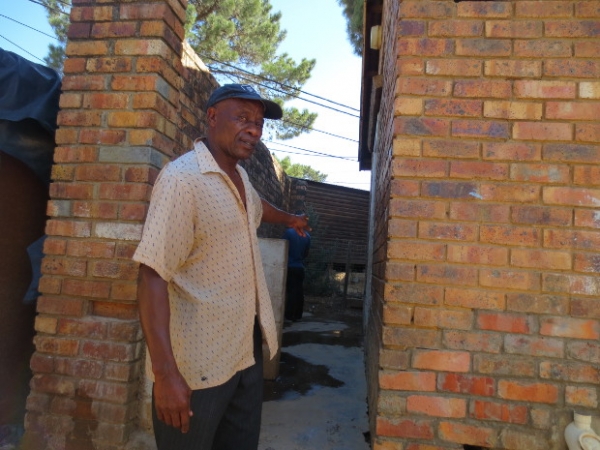

Mhlangabezi Jobela stands at the toilet block of the hostel where he lives in Kayamandi. Photo by Barbara Maragele.
15 April 2015
A large grey plastic bucket stands nearby one of several doorways in a derelict hostel in Kayamandi near Stellenbosch where Mhlangabezi Jobela has lived for more than 20 years.
In order to get ready for work every morning, the 59-year-old has to leave the hostel and walk about 300 metres to the communal toilets to fill his bucket with clean water at the nearest tap.
“The conditions here have become worse over the years. There is no running water or toilets inside the hostel. We only have the electricity boxes which we pay for. This place is falling apart,” he said.
Jobela is one of 26 residents living in the hostel who say they are tired of the “empty promises” made by the local municipality.
The hostel which is situated in the township, was built in 1976 by a local plywood company to house their migrant workers.
Over the years, the small 3x4 metre rooms have become home to families-most of whom are unemployed.
The outside of the hostel is covered with patches of wood and zinc sheets. Large holes can be seen in the ceiling boards and several chairs in the passage where several people are seen socializing.
Jobela said that when he moved to the township 23 years ago, the hostel seemed like an ideal place to live.
“I wasn’t earning a lot of money then. The hostel was the only place available where I didn’t have to pay rent to stay. My brother also moved into one of the other rooms. Now, we are old and can’t live like this anymore. We are tired of asking for help from the municipality,” he said.
A few metres away from the hostel is the face-brick communal toilet block that caters for everyone living in the surrounding shacks.
The pungent smell of urine and feces surrounded the area around it, as several of the toilets were either blocked or dirty.
Resident Andiswa Mhambi, 24, who grew up living in the hostel, sat in the passage in front of the room she shares with her partner and two children.
“We’ve been living here for so long. We see the municipality building houses for other people, but we are just left here. There are five people living inside one small room here. Some people have to sleep on the floor because there’s no space,” she said.
Mhambi said she feared for the safety of her toddlers who often walked to the toilets alone.
“It’s not safe. The toilets are blocked most of the time anyway,” she said.

Thandokazi Tuse (centre) sits on a double-bunk bed of the overcrowded hostel. Photo by Masixole Feni.
Stellenbosch Municipality spokesman Vernon Bowers said the dilapidated condition of the hostel and the limited space in the area are major challenges.
“The Municipality has always seen the dilapidated building in a serious light. To provide the necessary basic services is currently a huge challenge. Refurbishment of the hostel isn’t an option. It needs to be demolished,” he said.
In 2000, provincial government approved funding for the municipality’s Hostel Redevelopment Programme, Bowers said.
“This project subsequently led to more than 200 family units being built. Unfortunately, due to the limited suitable land in Kayamandi this particular programme stopped. We are looking into housing opportunities to the northern extension of town to help address this matter,” he said.
Bowers said the municipality was in the process of appointing a service provider to conduct profiles of the residents living in the township.
He added that upgrades to one of the communal toilet blocks were expected by 30 June.
“We plan to upgrade a further three blocks over the next two years. We have arranged to meet with the Kayamandi Development Forum to discuss various developmental matters in Kayamandi. The hostels will also be discussed,” he said.